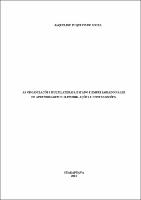| Compartilhamento |


|
Use este identificador para citar ou linkar para este item:
http://tede.unicentro.br:8080/jspui/handle/tede/353| Tipo do documento: | Dissertação |
| Título: | AS ORGANIZAÇÕES MULTILATERAIS, ESTADO E EMPRESARIADO NA LEI DE APRENDIZAGEM N° 10.097/2000: AÇÕES E CONTRADIÇÕES |
| Título(s) alternativo(s): | Multilateral Organs, the State e and the Business Community in the Law of Apprentice n° 10.097/2000: Actions and Contradictions |
| Autor: | Souza, Jaqueline Puquevis de  |
| Primeiro orientador: | Dalarosa, Adair Angelo |
| Resumo: | O objetivo deste estudo foi analisar a Lei de Aprendizagem nº 10.097/2000 e suas diretrizes curriculares, por meio do desenho político dos atuais programas de aprendizagem no Brasil, possibilitando a compreensão da atuação do Estado, organismos internacionais e empresariado nas políticas de educação profissional. Para isso, esta pesquisa está dividida em cinco partes. No primeiro momento, apresentamos nosso objeto de estudo, os interesses da pesquisadora pelo tema e apresentamos o método materialismo histórico-dialético, como embase teórico adotado. Posteriormente, analisamos as categorias juventude, trabalho e educação, trazendo pesquisas estatísticas sobre a realidade brasileira. No Capítulo II, fundamentamos conceitualmente os organismos multilaterais, suas origens, objetivos e documentos orientadores para a educação profissional. Focando os seguintes documentos: Reformas Econômicas e Trabalhistas na América Latina e Caribe (Produzido em paralelo ao Relatório sobre Desenvolvimento Mundial: o Trabalhador e o Processo de Integração Mundial) (1995);O Ensino e a formação técnico profissional: uma visão para o século XXI (1999); Educação e Conhecimento: eixo da transformação produtiva com equidade (1993) e Equidade e transformação produtiva: um enfoque integrado (1996). Sobre contexto nacional, foram discutidos, num primeiro momento, o Decreto 2.208/97, o PROEP e o PLANFOR.No III Capítulo, damos enfoque à Lei de Aprendizagem, discutindo suas diretrizes curriculares e verificando as possíveis influências do Estado, empresários e organismos multilaterais no discurso desses documentos. Por fim, notamos que a Lei de Aprendizagem, pode ser uma aliada na inserção no mercado de trabalho e desenvolvimento para muitos jovens, mas suas limitações, a falta de conhecimento de seus verdadeiros objetivos por parte dos empresários e os interesses em prol do capital, ainda são maiores. As influências das orientações internacionais para o desenvolvimento econômico dos países por meio da educação, do Estado e do empresariado, que adere aos discursos das OMs, mostraram-se evidentes no decorrer da análise dos documentos levantados. |
| Abstract: | The objective of this study is analyzing the Apprenticeship Law number 10.097/2000 and its curricular guidelines through the political vision of current programs of apprenticeship in Brazil. It makes possible to understand the influence of the State, international organisms and enterprises in professional educational policies. For that, this research is divided in five parts. Initialy, we discuss our object of study, researcher`s interests about the subject and we present the method dialectical historical materialism as theoretical basis. Posteriorly we analyze categories youth, work and education speaking about statistical researches about Brazilian reality. On Chapter II we conceptualize multilateral organisms, their origins, objectives and oriented documents to professional education. Studied documents were: Economic and Labour Reform in South America and Caribbean (written at the same time of report about Worldwide Development: the Worker and the Process of Worldwide Integration) (1995); the Education and the professional technical formation: a vision to the 21th century (1999); Education and Knowledge: main point of productive transformation with equity (1993) and Equity and productive transformation: an integrated approach (1996). On a first moment the Decree 2.208/97, the PROEP and the PLANFOR were discussed regarding national context. On Chapter III we emphasize the Apprenticeship Law, we discuss its curricular guidelines and we go over possible influences of State, businessmen and multilateral organisms in these documents. Finally we notice that Apprenticeship Law can help insertion in labour market and development to much youth but limitations, businessmen` deficient knowledge about its real objectives and interests that benefit the capital are bigger yet. Influences of international orientations to economic development of countries through education, State and enterprises joining speech from OMs were evident during the analysis of the documents. |
| Palavras-chave: | Lei de Aprendizagem juventude organismos multilaterais Estado empresariado Apprenticeship Law youth multilateral organisms State enterprises |
| Área(s) do CNPq: | CIENCIAS HUMANAS::EDUCACAO |
| Idioma: | por |
| País: | BR |
| Instituição: | UNICENTRO - Universidade Estadual do Centro Oeste |
| Sigla da instituição: | UNICENTRO |
| Departamento: | Unicentro::Departamento de Ciências Humanas, Letras e Artes |
| Programa: | Programa de Pós-Graduação em Educação (Mestrado - Irati) |
| Citação: | SOUZA, Jaqueline Puquevis de. AS ORGANIZAÇÕES MULTILATERAIS, ESTADO E EMPRESARIADO NA LEI DE APRENDIZAGEM N° 10.097/2000: AÇÕES E CONTRADIÇÕES. 2014. 111 f. Dissertação (Programa de Pós-Graduação em Educação - Mestrado - Irati) - Universidade Estadual do Centro Oeste, Guarapuava-PR. |
| Tipo de acesso: | Acesso Aberto |
| URI: | http://localhost:8080/tede/handle/tede/353 |
| Data de defesa: | 28-Fev-2014 |
| Aparece nas coleções: | Programa de Pós-Graduação em Educação (Mestrado - Irati) |
Arquivos associados a este item:
| Arquivo | Descrição | Tamanho | Formato | |
|---|---|---|---|---|
| PR JAQUELINE PUQUEVIS DE SOUZA.pdf | 1,2 MB | Adobe PDF |  Baixar/Abrir Pré-Visualizar |
Os itens no repositório estão protegidos por copyright, com todos os direitos reservados, salvo quando é indicado o contrário.




